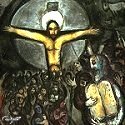|
In our Torah for this week (i.e., parashat Chukat), we read that after Miriam had died, the people again complained about the lack of water, and God instructed Moses to "speak to the rock" to satisfy their thirst. However Moses - perhaps still grieving over the death of his sister - then rebuked the people, saying: "Hear now, you rebels: shall we bring water for you out of this rock? And he lifted up his hand and struck the rock with his staff twice, and water came out abundantly, and the congregation drank, and their livestock" (Num. 20:10-11). The LORD, however, was not pleased by this representation and said to Moses and Aaron, "Because you did not believe in me (יַעַן לא־הֶאֱמַנְתֶּם בִּי), to reveal me as sacred in the eyes of the people of Israel, therefore you shall not bring this assembly into the land that I have given them" (Num. 20:12). ... Stunned silence ...
Jewish commentators have long struggled to understand this tragic episode, wondering whether it was because Moses had lost his temper with the people, or whether he had arrogantly claimed to be able to bring forth water by himself, or whether he had simply failed to obey God's explicit instruction to speak to (rather than to strike) the rock... We desire a straightforward explanation, a clear reason why God punished Moses and Aaron, but we are left wondering, questioning, struggling... And yet perhaps this is the point of the narrative – that there are reasons known only to God, and we must surrender our need to resolve the ambiguity of the outcome by means of trust. We might resist this solution, this great "cloud of unknowing," and we may continue searching, asking questions, and wondering; and yet often enough we discover there are no definitive answers, and even if we should accept a tentative one, our solution will inevitably lead to even further questions. As it is written: "One thing God has spoken, two things I have heard" (Psalm 62:11), which means that the Torah leads us to think, to enter into dialog, to search for truth. With one word, we often hear two things, which suggests the process of understanding in light of trust. Indeed we often hear and only later are able to listen to what was heard.
The Scriptures do not command us to believe "on cue," but rather reveal a world of questions for our hearts to ponder. Indeed, instead of regarding the Bible as a "Book of Answers" for our questions, it is worthwhile to think of it as a "Book of Questions" for our answers. As we listen, God questions us so that we can know him by means of the dialog within our hearts. As any good teacher knows, when a student earnestly wrestles with a question he learns more than if he were given a straightforward answer. Similarly, the Lord gives us permission to be without answers so that we will be free to seek, to struggle, and to "own" what we come to understand through our relationship with him... That way our learning will be real, substantive, and born from the urgency our own inner need. Indeed, God's very first question to man is always, ayekah: "Where are you?" (Gen. 3:9), which appeals for us to acknowledge how we hide from the truth. "Where are you?" is the poignant call of the Seeking Father for his lost child, and the question only becomes "our own" when we are willing to look at how we've come to be at this place in our lives. God's question to our heart is meant to lead us out of hiding to respond to his loving call...
Note: Of course Moses eventually made it into the Promised Land, as revealed in the account of the "transfiguration" of Messiah given in the Gospels (Matt. 17:3-4; Mk 9:4-5), and therefore the prophetic reason he was forbidden to enter the land after the Exodus from Egypt may have been to symbolize the need for Yehoshua (Joshua) to arise for Israel.
Related Topics:
<< Return
|


